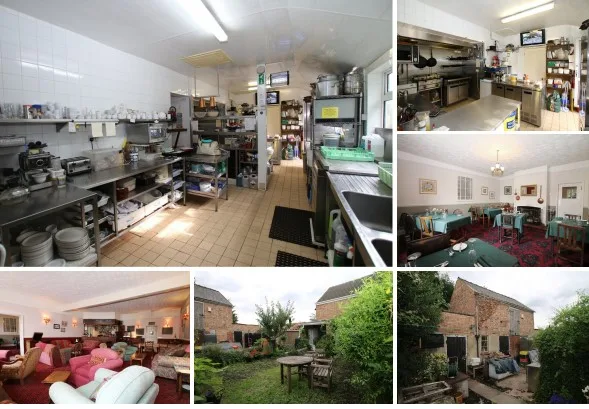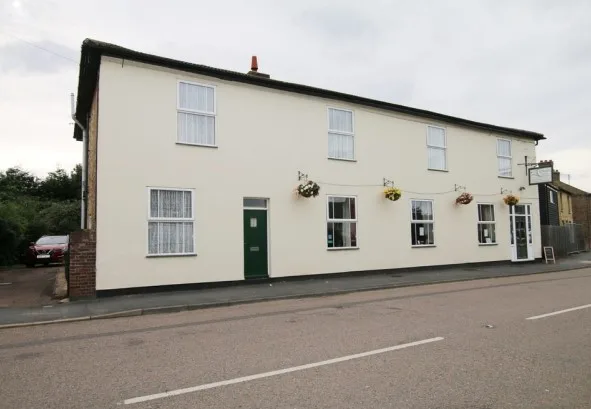A former village restaurant – sold off an asking price of £375,000 – has been refused permission to turn it into a hostel for agricultural workers.
The Planning Inspectorate has dismissed an appeal by Mr Simon Howard (Howard Renovations Ltd) against the decision of Fenland District Council.
Mr Howard had wanted change of use permission for the former Classics restaurant in Station Road, Manea.
He had proposed turning the restaurant and two bed home into a mixed used, 7 bed accommodation for up to 18 residents.
The application had been widely criticised in the village with more than 80 letters opposed to it sent to the district council.

Residents’ objections ranged from noise, police being called out multiple times to incidents, lack of parking, limited public transport, and an “unwelcome precedent”.
Of 14 supporting comments, these ranged from support for local shops and takeaways, a “perfect layout of an HMO”, and claims that false accusations had been made about alleged incidents.
Mr Howard said the restaurant was in a poor state before he took over and his company planned on “bringing it back to its former glory”.
He added: “It will also provide farm workers with reasonable priced accommodation.

“Being local to the area we know that ‘Classics’ has been a restaurant/ B&B for over 30 years. It has never had any issues from residents concerned about the parking or accommodation.”
F Rafiq, the planning inspector, explained that the application showed a reduced number of occupants from a maximum of 30 to 18, and also included the removal of the proposed flats whilst retaining an existing outbuilding.
Revised scheme
“It is clear from the evidence before me that the interested parties to this appeal are aware of the changes and have had the opportunity to make representations on the revised scheme,” he said.
“The revised description of development also includes reference to ‘part retrospective’, but it was confirmed at the hearing that the change of use as applied for had not commenced.
“For clarity, I have considered this appeal based on the revised description of development as a proposal, and on the basis of the plans submitted to and considered by the council.”
Mr Rafiq said one issue was the effect of the proposed development on the living conditions of surrounding homes with regard to noise and disturbance and privacy.
Another was whether the proposal would provide satisfactory living conditions for future occupants with regards to amenity space provision.
And thirdly he had considered the need for agricultural workers accommodation.

“The proposed change of use would provide shared residential accommodation for up to 18 residents,” he said.
“The shared accommodation would be occupied by a group of unconnected people, so the external amenity space would likely be used for greater lengths of time than a garden used by a family.
“Given the proximity of the appeal site to neighbouring properties on Station Road, and to those on Orchard Way to the rear, this element of the proposal would likely cause an unacceptable level of noise and disturbance to neighbouring occupiers, including to the occupants of the retained dwelling on the appeal site.”
No harm caused
He said Fenland Council raised concern that the existing home on the appeal site could be occupied intensively by several additional residents to those that would occupy the proposed 7-bedroom shared accommodation.
“Although this dwelling sits within the appeal site, no changes are proposed to the modest two-bedroom existing property,” said the inspector.
“Therefore, I do not consider harm would be caused.”
The inspector said parking would not give rise to undue noise and disturbance.
He also said that despite the potential level of occupancy, that this would not necessarily give rise to anti-social behaviour.
“Nevertheless, I conclude that the proposal would result in unacceptable harm to the living conditions of surrounding residential occupiers with regard to noise and disturbance,” he concluded.
There was “common ground between the main parties that there is a need for affordable, rural workers accommodation in Manea, where the main economic activities relate to agriculture.
“Despite the undisputed need for this type of accommodation, there wasn’t any evidence provided to support its provision at this location, such as the lack of alternative sites in Manea or other areas that are accessible to agricultural enterprises in the surrounding rural area”.
Advantages outlined
The inspector said there may be advantages of housing 18 workers in one location, which is accessible to local services and public transport, but Mr Howard was not able to provide further details on where such workers would be employed, and whether their work would be co-located with one employer.
“As a result, there is no evidence that the provision of accommodation to meet the need for rural workers, could not be provided for at different locations, particularly as the submissions before me indicate that the occupants would be working in shifts and therefore could be living in different location,” he said.
The inspector said Mr Howard had referenced problems faced by workers when they live on an agricultural unit itself from noise and odour by general farming activity.
“However, I am not persuaded that alternative accommodation, such as mobile homes would necessarily provide unsatisfactory conditions as the appellant has set out,” he said.
The inspector agreed “there would undoubtedly be benefits arising from the provision of the accommodation that this appeal scheme proposes.
“I attach some weight to these benefits, but this is limited by the lack of justification for such accommodation to be at this specific site.
Tempers the weight
“The appellant confirmed that as well as workers in the agricultural sector, the proposed accommodation would be available to other occupants not working in this sector. This tempers the weight that I am able to afford these benefits.”
The inspector concluded: “I have considered the contribution this proposal would make to the provision of affordable rural workers accommodation and supporting a prosperous rural economy.
“However, such benefits attract limited weight for the reasons set out. I have attached moderate weight to the reuse of an existing building and the benefits to local services and trades.”
He said: “I have found that the proposed development would be harmful to the living conditions of surrounding residential occupiers with regard to noise and disturbance.
“This harm would be permanent and I ascribe this substantial weight which would not be outweighed by the positive benefits of the scheme.”



















